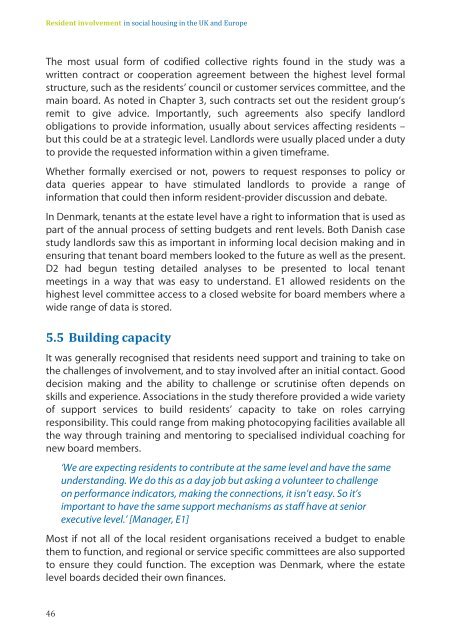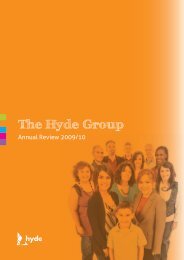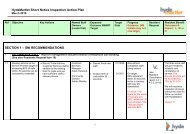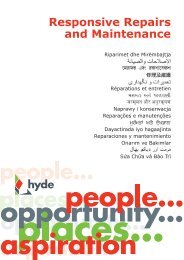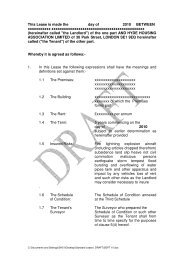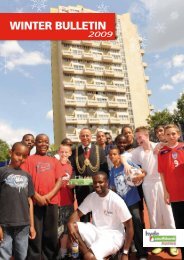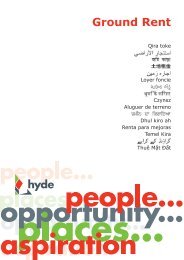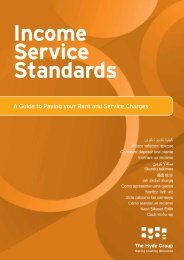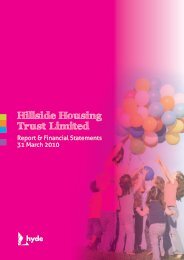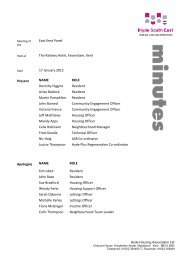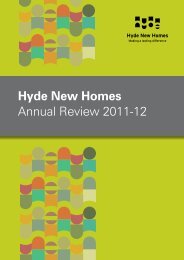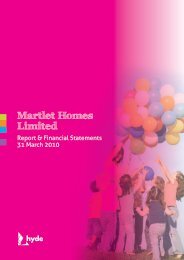Resident involvement - Hyde Housing Association
Resident involvement - Hyde Housing Association
Resident involvement - Hyde Housing Association
You also want an ePaper? Increase the reach of your titles
YUMPU automatically turns print PDFs into web optimized ePapers that Google loves.
<strong>Resident</strong> <strong>involvement</strong> in social housing in the UK and Europe<br />
The most usual form of codified collective rights found in the study was a<br />
written contract or cooperation agreement between the highest level formal<br />
structure, such as the residents’ council or customer services committee, and the<br />
main board. As noted in Chapter 3, such contracts set out the resident group’s<br />
remit to give advice. Importantly, such agreements also specify landlord<br />
obligations to provide information, usually about services affecting residents –<br />
but this could be at a strategic level. Landlords were usually placed under a duty<br />
to provide the requested information within a given timeframe.<br />
Whether formally exercised or not, powers to request responses to policy or<br />
data queries appear to have stimulated landlords to provide a range of<br />
information that could then inform resident-provider discussion and debate.<br />
In Denmark, tenants at the estate level have a right to information that is used as<br />
part of the annual process of setting budgets and rent levels. Both Danish case<br />
study landlords saw this as important in informing local decision making and in<br />
ensuring that tenant board members looked to the future as well as the present.<br />
D2 had begun testing detailed analyses to be presented to local tenant<br />
meetings in a way that was easy to understand. E1 allowed residents on the<br />
highest level committee access to a closed website for board members where a<br />
wide range of data is stored.<br />
5.5 Building capacity<br />
It was generally recognised that residents need support and training to take on<br />
the challenges of <strong>involvement</strong>, and to stay involved after an initial contact. Good<br />
decision making and the ability to challenge or scrutinise often depends on<br />
skills and experience. <strong>Association</strong>s in the study therefore provided a wide variety<br />
of support services to build residents’ capacity to take on roles carrying<br />
responsibility. This could range from making photocopying facilities available all<br />
the way through training and mentoring to specialised individual coaching for<br />
new board members.<br />
‘We are expecting residents to contribute at the same level and have the same<br />
understanding. We do this as a day job but asking a volunteer to challenge<br />
on performance indicators, making the connections, it isn’t easy. So it’s<br />
important to have the same support mechanisms as staff have at senior<br />
executive level.’ [Manager, E1]<br />
Most if not all of the local resident organisations received a budget to enable<br />
them to function, and regional or service specific committees are also supported<br />
to ensure they could function. The exception was Denmark, where the estate<br />
level boards decided their own finances.<br />
46


